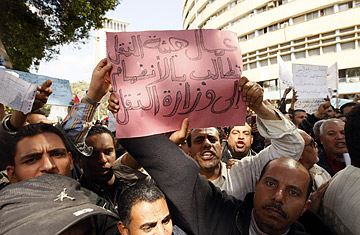
Employees of the transport authority rally in Cairo to demand better wages and working conditions on February 14, 2011.
(2 of 2)
Still, while they lack political clout, the lower class masses — at least in the form of striking workers — have been loud. A new $83 billion budget for fiscal year 2011-2012 released by the Egyptian finance ministry on June 22 says as much about reform priorities as it does about who's making noise. The budget pours money into social welfare spending and subsidies, apparently attempts to address working class unhappiness. And on Friday, workers groups that established the country's first independent labor union federation in March are calling for a million man protest to demand that the government crack down on cronyism in job hiring and uphold its promises to establish better worker rights.
In Zagazig, the railway workers say they want overtime compensation and better pay. Some say they make little more than 500 Egyptian Pounds ($84) a month — hardly enough to raise a family on, and still 200 Egyptian Pounds below the new national minimum wage. "We normal people are calling for our rights," explains one train air conditioner technician plainly.
After security forces cleared the tracks last week, railway workers received a promise from the national Railway Committee, the governor, and the local security chief, that their demands would be met. "They've spoken, but we'll see if they'll pay," says one accountant at the Zagazig train station. "To be honest, how will they pay if there is no income? The economy is in a bad state."
